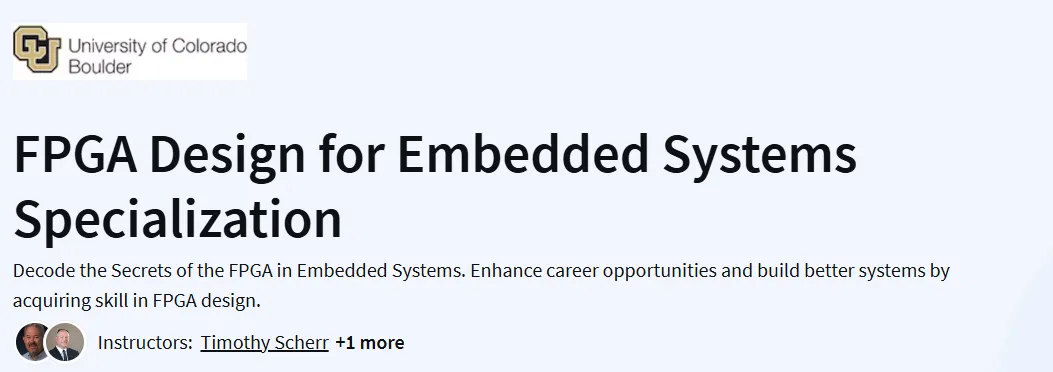FPGA Design for Embedded Systems Specialization
A comprehensive specialization that equips learners with essential skills in FPGA design for embedded systems.
What you will learn in FPGA Design for Embedded Systems Specialization Course
- FPGA Fundamentals: Understand the architecture and history of Field-Programmable Gate Arrays (FPGAs) and Complex Programmable Logic Devices (CPLDs).
- Hardware Description Languages: Learn to design circuits using VHDL and Verilog, the most widespread design methods for FPGA design.
- FPGA Development Tools: Gain proficiency in using state-of-the-art software tools for FPGA development, including simulation and debugging.
- Embedded Systems Design: Design and implement embedded systems using FPGAs, integrating soft-core processors and peripherals.
- System-on-Chip (SoC) Design: Create a working SoC design with a Nios II soft processor, RAM, FLASH memory, and peripherals.
Program Overview
Introduction to FPGA Design for Embedded Systems
⏳ 18 hours
Learn about FPGA technology and its applications in embedded systems.
Understand the FPGA development flow: specification, synthesis, simulation, compilation, programming, and debugging.
Design basic logic circuits using Look-Up Tables (LUTs).
Hardware Description Languages for FPGA Design
⏳ 20 hours
Master VHDL and Verilog for FPGA design.
Develop skills in writing and simulating hardware descriptions.
Use test benches to verify the correctness of designs.
FPGA Softcore Processors and IP Acquisition
⏳ 20 hours
Learn about soft processors and Intellectual Property (IP) cores in FPGA design.
Design custom soft processors and integrate them with peripherals.
Verify designs using simulation and internal logic analyzers.
FPGA Capstone: Building FPGA Projects
⏳ 20 hours
Apply knowledge to create a complete FPGA-based project.
Develop both hardware and software components.
Submit project files and lab notebooks for grading.
Get certificate
Job Outlook
- Proficiency in FPGA design is valuable for roles such as FPGA Engineer, Embedded Systems Engineer, and Hardware Design Engineer.
- Skills acquired in this specialization are applicable across various industries, including telecommunications, automotive, aerospace, and consumer electronics.
- Completing this specialization can enhance your qualifications for positions that require expertise in FPGA technology and embedded systems design.
- Taught by experienced instructors from the University of Colorado Boulder.
- Hands-on assignments and projects to reinforce learning.
- Applicable to both academic and industry settings.
- Requires access to specific hardware and software tools.
- Commitment to complete all courses for certification.
Specification: FPGA Design for Embedded Systems Specialization
|
FAQs
- The course assumes basic familiarity with digital electronics and programming concepts.
- Beginners can follow with supplementary resources on digital logic, VHDL/Verilog, and embedded systems basics.
- Understanding microcontrollers and hardware interfacing is helpful but not mandatory.
- Assignments and labs provide guided experience to bridge gaps in practical knowledge.
- VHDL and/or Verilog are the primary languages used for FPGA programming.
- FPGA development environments such as Xilinx Vivado or Intel Quartus are required.
- Basic scripting skills in Python or MATLAB may be helpful for simulations.
- Starter templates and lab instructions are often provided to guide learners through the setup.
- The course teaches FPGA design principles applicable to real embedded systems.
- Projects simulate real-world scenarios such as digital signal processing, hardware accelerators, and IoT integration.
- Direct application may require access to FPGA boards and development kits.
- Knowledge gained can be used in industrial, research, and academic projects.
- Basic discrete mathematics, Boolean algebra, and logic design are fundamental.
- Understanding timing analysis, state machines, and digital circuits is helpful.
- The course emphasizes practical implementation over complex theoretical derivations.
- Assignments focus on applying concepts to FPGA design rather than purely abstract problems.
- Completing the specialization demonstrates practical FPGA design skills relevant to embedded systems roles.
- Enhances resumes for positions in electronics, IoT, robotics, and hardware development.
- Building projects and portfolios alongside the course strengthens employability.
- Additional hands-on experience with FPGA boards is recommended for industry readiness.





